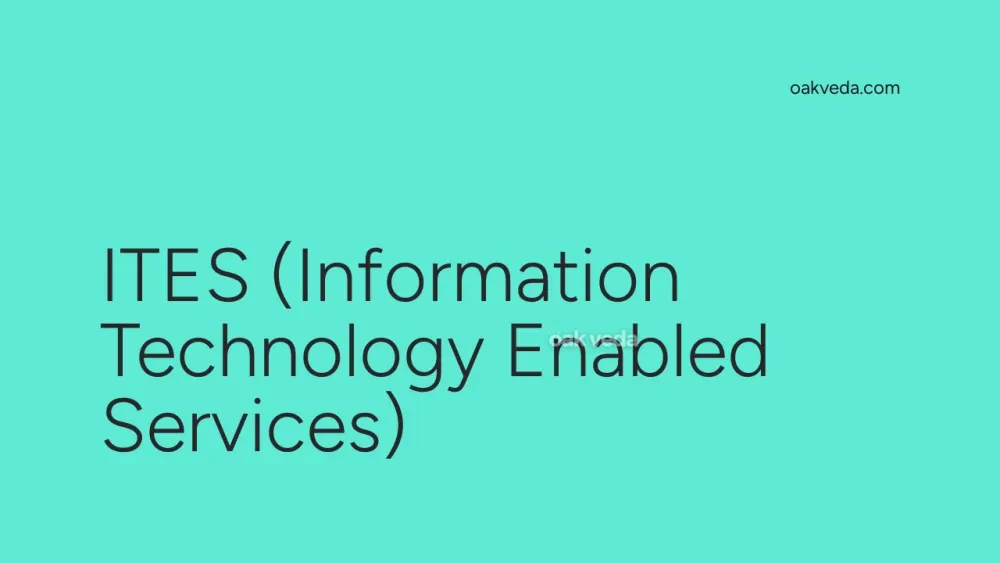
What is the Full Form of ITES?
ITES is the acronym for Information Technology Enabled Services. This term refers to a wide range of services that leverage information technology to improve business processes and enhance organizational efficiency. ITES is also known as remote services or web-enabled services, playing a crucial role in the modern digital economy.
What is Information Technology Enabled Services?
Information Technology Enabled Services (ITES) encompass a broad spectrum of business and technical services delivered through IT infrastructure. These services utilize technology to streamline operations, reduce costs, and improve overall productivity for organizations across various industries. ITES has become an integral part of global business strategies, particularly in outsourcing and offshoring operations.
Origin and Development of ITES
The concept of ITES emerged in the late 1990s and early 2000s as advancements in information technology and telecommunications made it possible to deliver services remotely. India played a pivotal role in the development of the ITES sector, quickly becoming a global hub for outsourcing these services. The country's large pool of skilled English-speaking professionals and cost-effective labor made it an attractive destination for multinational companies looking to outsource their IT-enabled services.
How does ITES work?
ITES operates by leveraging information technology infrastructure to deliver various services remotely. This typically involves:
- Identifying business processes that can be outsourced or improved through technology
- Implementing IT systems and software to support these processes
- Training personnel to use the technology effectively
- Establishing communication channels between service providers and clients
- Continuously monitoring and improving service quality
Types of ITES
ITES encompasses several specialized service categories, including:
- BPO (Business Process Outsourcing): Outsourcing non-core business functions like customer support, data entry, and accounting.
- KPO (Knowledge Process Outsourcing): Outsourcing high-level tasks requiring specialized knowledge and expertise.
- LPO (Legal Process Outsourcing): Outsourcing legal services such as document review, legal research, and contract management.
- GPO (Game Process Outsourcing): Outsourcing various aspects of game development and testing.
- Call Centers: Providing customer support and telemarketing services.
- Back Office Operations: Managing administrative tasks like data processing and payroll management.
- Logistics Management: Optimizing supply chain and transportation processes.
Functions of ITES
ITES serves several critical functions in modern business operations:
- Process Optimization: Streamlining business processes to improve efficiency and reduce costs.
- Data Management: Handling large volumes of data, including storage, analysis, and reporting.
- Customer Relationship Management: Enhancing customer interactions through various channels.
- Technical Support: Providing IT support and troubleshooting services.
- Content Development: Creating and managing digital content for various platforms.
- Financial Services: Offering accounting, bookkeeping, and financial analysis services.
Applications of ITES
ITES finds applications across numerous industries and sectors:
- Healthcare: Medical transcription, telemedicine, and health information management.
- Finance: Banking operations, insurance processing, and financial analysis.
- E-commerce: Order processing, inventory management, and customer support.
- Education: Online learning platforms, content development, and student support services.
- Travel and Hospitality: Reservation systems, customer service, and loyalty program management.
- Manufacturing: Supply chain management, quality control, and inventory tracking.
Features of ITES
Key features of ITES include:
- Scalability: Ability to quickly scale services up or down based on demand.
- Cost-effectiveness: Reduced operational costs through outsourcing and process optimization.
- 24/7 Availability: Round-the-clock service delivery across different time zones.
- Specialized Expertise: Access to skilled professionals in various domains.
- Technology Integration: Utilization of cutting-edge IT tools and platforms.
- Data Security: Implementation of robust security measures to protect sensitive information.
Benefits of ITES
ITES offers numerous advantages to businesses:
- Increased Efficiency: Streamlined processes lead to faster turnaround times and improved productivity.
- Cost Reduction: Outsourcing non-core functions can significantly reduce operational expenses.
- Focus on Core Competencies: Allows organizations to concentrate on their primary business activities.
- Access to Global Talent: Enables companies to tap into a diverse pool of skilled professionals worldwide.
- Improved Customer Service: Enhanced customer support capabilities through advanced technologies.
- Flexibility and Scalability: Ability to adapt quickly to changing business needs and market conditions.
Limitations or Challenges of ITES
Despite its benefits, ITES also faces certain challenges:
- Data Security Concerns: Risk of data breaches and privacy issues when handling sensitive information.
- Cultural and Language Barriers: Potential communication issues in cross-border service delivery.
- Quality Control: Maintaining consistent service quality across different locations and teams.
- Dependency on Technology: Vulnerability to technical failures and cybersecurity threats.
- Regulatory Compliance: Navigating complex legal and regulatory requirements across different countries.
Future Developments in ITES Technology
The ITES sector continues to evolve with emerging technologies:
- Artificial Intelligence and Machine Learning: Enhancing automation and decision-making processes.
- Cloud Computing: Enabling more flexible and scalable service delivery models.
- Internet of Things (IoT): Integrating smart devices for improved data collection and analysis.
- Blockchain: Enhancing security and transparency in data management and transactions.
- Virtual and Augmented Reality: Revolutionizing training, support, and customer experience in ITES.
FAQs on ITES Full Form
-
What industries benefit most from ITES? ITES benefits a wide range of industries, including healthcare, finance, e-commerce, education, and manufacturing.
-
How does ITES differ from IT services? While IT services focus on providing technical solutions, ITES leverages IT to deliver a broader range of business services and processes.
-
Is ITES only about outsourcing? No, while outsourcing is a significant component, ITES also includes in-house technology-enabled services that improve business operations.
-
What skills are important for a career in ITES? Key skills include technical proficiency, communication, problem-solving, and domain-specific knowledge relevant to the service area.
-
How is data security ensured in ITES? ITES providers implement robust security measures, including encryption, access controls, and compliance with international data protection standards.
You may be interested in:

